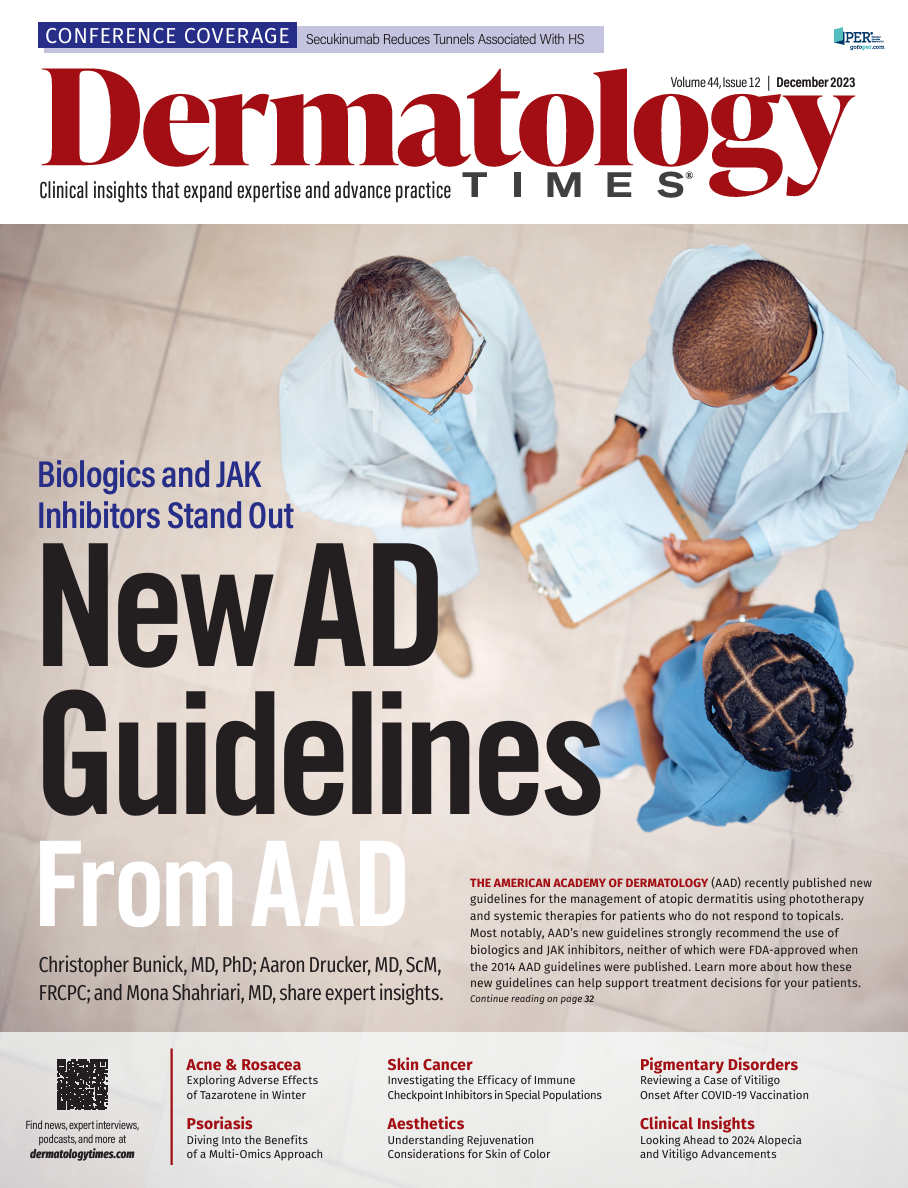- Case-Based Roundtable
- General Dermatology
- Eczema
- Chronic Hand Eczema
- Alopecia
- Aesthetics
- Vitiligo
- COVID-19
- Actinic Keratosis
- Precision Medicine and Biologics
- Rare Disease
- Wound Care
- Rosacea
- Psoriasis
- Psoriatic Arthritis
- Atopic Dermatitis
- Melasma
- NP and PA
- Skin Cancer
- Hidradenitis Suppurativa
- Drug Watch
- Pigmentary Disorders
- Acne
- Pediatric Dermatology
- Practice Management
- Prurigo Nodularis
- Buy-and-Bill
News
Article
Dermatology Times
Promising Results for Roflumilast Cream 0.15% From the INTEGUMENT Phase 3 Trials
Author(s):
Halyna/Adobestock

A poster presented at the American College of Allergy, Asthma and Immunology (ACAAI) 2023 Annual Scientific Meeting found once daily roflumilast cream 0.15% safely and significantly improved atopic dermatitis.
The poster shared pooled results of INTEGUMENT-1 and INTEGUMENT-2 phase 3 trials in patients 6 years old or older with mild to moderate atopic dermatitis.1 Both studies were double-blinded vehicle-controlled multicenter studies.
The INTEGUMENT studies randomized 884 participants to 0.15% roflumilast cream and 453 participants to vehicle cream for weeks of once daily treatment. Mean age of participants was 19.4, and about half (55.3%) of participants were female. Most patients (82.6%) identified as not Hispanic/Latino for ethnicity; 59.8% were white, 19.9% were Black of African American, 12.9% were Asian. Most participants (76.1%) had baseline Validated Investigator Global Assessment for Atopic Dermatitis (vIGA-AD) of 3, the rest were 2. Mean baseline body surface area was 13.5 and mean baseline EASI score was 10.1. Study Worst Itch Numeric Rating Scale (WI-NRS) at baseline was 858, and 1.9% had facial involvement.
Study investigators identified vIGA-AD success at week 4 as the primary endpoint; WI-NRS success, vIGA-AD success at weeks 1 and 2 and vIGA-AD scored clear or almost clear were the secondary endpoints.
In comparison with the participants in the vehicle group, patients in the roflumilast group fared better at weeks 1, 2, and 4. Daily diary indicated itch improvement with roflumilast cream 0.15% was rapid, and was observed 24 hours following the first application (p<0.0001) as compared with vehicle cream. Moreover, 31.1% of patients in the treatment group achieved vIGA-AD success versus 14.1% in the vehicle group. Investigators also reported 41.1% of patients in the roflumilast group achieved clear or almost clear on vIGA-AD at week 4, compared with 21.4% of patients in the vehicle group.
The most common treatment emergent adverse events were headache (2.9% and 0.9% for roflumilast and vehicle groups, respectively), nausea (1.9% and 04%), application site pain (1.5% and 0.7%), diarrhea (1.5% and 0.4%), vomiting (1.5% and 0.4%) and COVID-19 (0.8% and 1.8%). There were 8 (0.9%) treatment-emergent serious adverse events in the roflumilast group and none in the vehicle group. Fourteen patients and 5 patients discontinued trial or trial drug as a result of the adverse event in the roflumilast and vehicle groups, respectively.
“Once-daily roflumilast cream 0.15% improved atopic dermatitis across multiple efficacy endpoints while demonstrating favorable safety and tolerability in 2 Phase 3 trials,” said, Lawrence F. Eichenfield, MD, chief of pediatric and adolescent dermatology at Rady Children's Hospital-San Diego and professor of dermatology and pediatrics and vice-chair of the department of dermatology at UC San Diego School of Medicine, on behalf of the study team.
Roflumilast is a nonsteroid phosphodiesterase inhibitor that modulates inflammatory cytokines. Previous studies have found similar efficacy and safety. In September, the INTEGUMENT-PED phase 3 trial of roflumilast cream .05% met primary and secondary endpoints for treatment of mild to moderate atopic dermatitis in children ages 2 to 5 years. September also saw positive results from the long-term open-label trial of roflumilast cream 0.15% in adults and children ages 6 years and older with atopic dermatitis; the drug was found to be well-tolerated without new safety signals during treatment for up to 56 weeks as part of its phase 3 INTEGUMENT-OLE (NCT04804605) study in September. Similarly, the US Food and Drug Administration approved a supplemental new drug application for the expanded indication of roflumilast cream 0.3% for the treatment of plaque psoriasis in children ages 6 to 11 years in October.
Reference
1. Eichenfield LE, Boguniewicz M, Simpson EL, et al. Once-Daily Roflumilast Cream 0.15% for Atopic Dermatitis: Pooled Results From INTEGUMENT-1/2 Phase 3 Trials. Poster presented at American College of Allergy, Asthma and Immunology 2023 Annual Scientific Meeting; November 9-13; Anaheim, CA.







